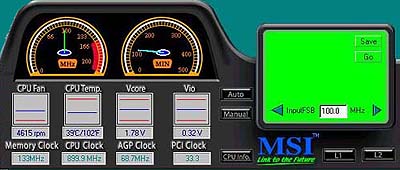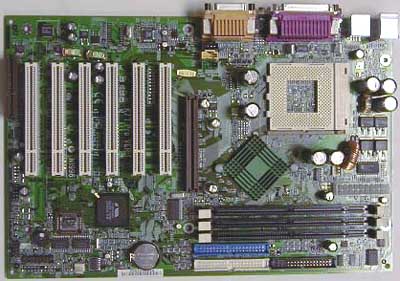Firingsquad heeft de K7T Pro van MSI aan de tand gevoeld. De opmerking die door het hele review naar voren komt is het ontbreken van de mogelijkheid de multiplier te veranderen. Het is echter wel mogelijk om het voltage van de processor te veranderen (in het BIOS) en de FSB op te krikken. (De mogelijkheden zijn 100, 101, 102, 103, 105, 107, 109, 110, 111, 113, 115, 117, 120, 125, 130, 133, 135, 137, 139, 140, 143, 145, 148, 150, 155 en 167MHz)
Dit laatste kan ook gerealiseerd worden dmv "Fuzzy Logic". Hiermee kan je een Windows-programmatje de FSB langzaam op laten voeren en wanneer het systeem instabiel wordt, start je je computer opnieuw op en laat je 'm draaien op de laatste stabiele frequentie. Ook het handmatig tweaken van deze instellingen is via hetzelfde Windows-progje mogelijk.
De 900MHz Thunderbird van het test-systeem kon niet erg ver omhoog gehaald worden: 945MHz klinkt niet erg goed. Met een 700MHz Duron werden net iets betere resulaten geboekt, deze processor werd stabiel geklokt op een kleine 770MHz.
Hieronder zijn nog een stukje uit de conclusie plus afbeeldingen van het Fuzzy Logic-progje en het moederbord zelf te vinden:
The K7T Pro does so much so well, but comes up short in just a few too many features for us to award it a higher score. Unlike the A7V and KT7, the K7 Pro doesn't offer clock multiplier adjustments for the CPU. On a similar note, the K7T Pro doesn't include ATA/100 support like the A7V.
When you consider that the A7V can be purchased for just a bit more and offers slightly greater performance, it's a bit hard to recommend the K7T Pro. Sure, it's got convenience features like the diagnostic LEDs and Fuzzy Logic utility, but the A7V offers a little more bang for your buck.
If you're not concerned with overclocking your processor, and this will be the first system you build, the K7T Pro would make an excellent choice. As we stated earlier, with the diagnostic LEDs, troubleshooting your system is a breeze; and with Fuzzy Logic support, MSI can do all the overclocking for you!
  |
